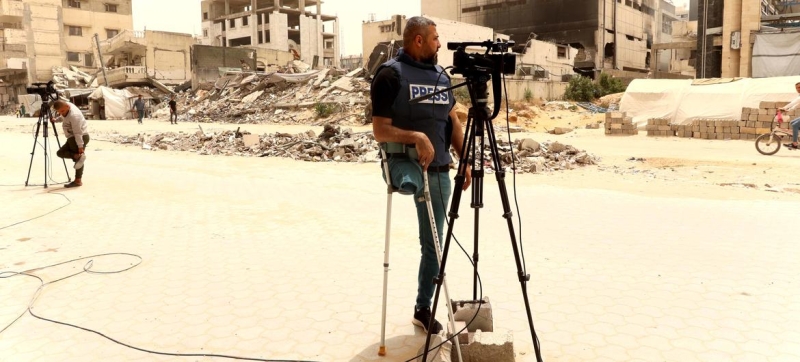
Palestinian journalist Sami Shehada lost his leg in an attack in Gaza. UN: 85 percent of journalist murders worldwide remain unsolved Human Rights
Globally, nearly nine out of ten murders of journalists remain unsolved. This data is provided by UN Secretary-General Antonio Guterres in his message on the occasion of the International Day to End Impunity for Crimes against Journalists.
Between August 2023 and May 2025, UNESCO recorded the killing of 163 journalists. 109 media workers, including 12 women, died in conflict zones, mainly in Gaza (46), Sudan (13) and Ukraine (8).
The International Day to End Impunity for Crimes against Journalists was established by the UN General Assembly in 2013 and is celebrated on November 2. The date was chosen in memory of two French journalists killed in Mali in 2013. This day reminds the world that impunity for violence against members of the media undermines freedom of expression, democracy and the public’s right to accurate information.
“I condemn the killings of journalists in Gaza, express outrage at the large number of them, and call for independent and impartial investigations,” the UN chief said in a report released this year. “I also note that a ban that prevents international journalists from entering Gaza is unacceptable.”
Killings of journalists continue to occur in non-war countries. Thus, according to UNESCO, in Mexico the situation is more dangerous than in many conflict zones: during the period under review, 15 media workers were killed there. The largest number of confirmed cases of murder of journalists were reported in the Arab States (82), followed by countries in Latin America and the Caribbean (34), Africa (5), Asia-Pacific (30) and Europe and North America (12).The global level of impunity for crimes against media workers is still very high, the UN Secretary-General states: although it has decreased by one percent compared to 2022, 85 percent of murders of journalists remain unsolved.
According to UNESCO, the highest level of impunity is recorded in the Middle East and North Africa region, followed by Asia-Pacific and Africa. Impunity in many countries continues to be attributed to weak and corrupt law enforcement and judicial systems, a lack of political will, and links between politicians, corrupt businesses and organized crime.
“On this International Day, we would like to remind you how important the safety of journalists, their independence and protection in carrying out their mission is to preserve peace and ensure social progress,” reads a message from UNESCO Director-General Audrey Azoulay. Without Borders,” which the UN Secretary General cites in his report, at least 1,163 journalists were detained around the world between 2023 and 2025, with 568 of them still in custody in 48 countries. Almost half of all cases of journalists imprisoned occur in five countries: Belarus, China, Israel, Myanmar and the Russian Federation.
In recent years, cases of abuse of legislation have become more frequent in a number of states, including laws on defamation (public dissemination of information discrediting the honor, dignity or reputation of a person), laws on combating terrorism and other legislative acts related to the security sector, the application of which does not comply with international law. resources
According to the report, citing Reporters Without Borders, there is a correlation between the high intensity of natural resource exploitation in countries and their low ranking in the World Press Freedom Index. Between 2013 and 2021, 78 percent of hydrocarbons (oil, gas and coal), 45 percent of mining products, and 67 percent of forest products came from countries with press freedom conditions rated as “severe” or “very serious.”
Journalists who report on environmental damage often have to report on the negative impacts or unscrupulous practices of powerful corporations, as well as regulatory corruption, collusion between government officials and corporations, government-sanctioned projects with huge environmental consequences, and systemic flaws in environmental policies.
When journalists are forced to keep silent, we all lose our voice
“Free and independent journalism is a critical public good, and journalists everywhere must be able to work freely, impartially and without fear,” António Guterres recalled in his report. “Despite this, attacks on journalists continue around the world.”
To solve the problems faced by journalists, it is extremely important to take quicker and more effective response measures, the Secretary General noted. In his opinion, first of all, states should put an end to impunity for the murders of journalists, which has “reached an unacceptably high level”, through prompt, effective, thorough, impartial and independent investigations. “Let’s work together to defend press freedom, demand accountability, and ensure that those who speak truth to power can do so without fear.”
